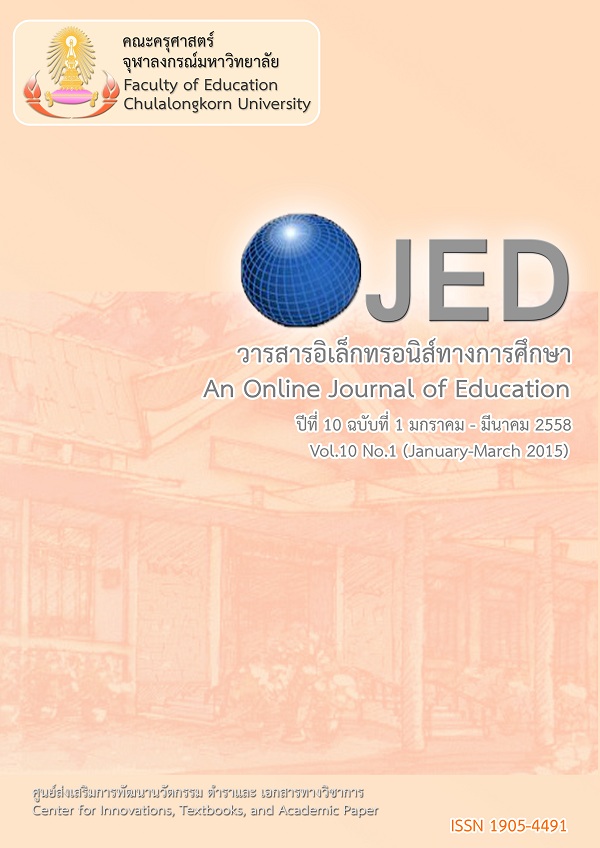การวิเคราะห์ความต้องการจำเป็นในการเรียนทักษะการฟังและการพูดภาษาอังกฤษของนักศึกษาที่เรียน ภาษาอังกฤษเป็นภาษาต่างประเทศสาขาบริหารธุรกิจมหาวิทยาลัยอัสสัมชัญ
Keywords:
ทักษะการฟัง/ ทักษะการพูด/ สาขาวิชาธุรกิจ/ การสอนภาษาอังกฤษเป็นภาษาต่างประเทศ/AURAL SKILLS/ ORAL SKILLS/ BUSINESS MAJORS/ EFLAbstract
การวิจัยครั้งนี้มีวัตถุประสงค์เพื่อวิเคราะห์ความต้องการจำเป็นของทักษะการฟังและการพูดภาษาอังกฤษเชิงวิชาการจากนักศึกษาระดับปริญญาตรีในสาขาวิชาธุรกิจ ได้แก่ ภาษาอังกฤษธุรกิจ ดนตรีธุรกิจ เศรษฐศาสตรธุรกิจ และสารสนเทศธุรกิจ จำนวน 66 คน และอาจารย์ที่สอนทางธุรกิจจำนวน 10 คน ในมหาวิทยาลัยอัสสัมชัญ เครื่องมือที่ใช้ในการเก็บรวบรวมข้อมูลคือ 1) แบบสอบสอบถามที่ใช้ระบุความต้องการจำเป็นที่แท้จริงของทักษะการฟัง-พูดภาษาอังกฤษสำหรับนักศึกษา และสำหรับใช้ประเมินระดับความเห็นพ้องของทั้ง 2 กลุ่ม 2) แบบสัมภาษณ์กึ่งโครงสร้างที่ใช้เพื่ออธิบายปัญหาทักษะการฟังและการพูดภาษาอังกฤษสำหรับนักศึกษา
ผลการวิเคราะห์เชิงปริมาณพบว่า: 1) กลุ่มตัวอย่างมีความรู้สึกว่าทักษะการอภิปรายและ การสัมภาษณ์กับเจ้าของภาษามีความจำเป็นอย่างมากต่อการประสบความสำเร็จในหลักสูตรธุรกิจ 2) มีความแตกต่างกันอย่างมากของระดับความเห็นพ้องตรงกันระหว่าง 2 กลุ่ม ในลำดับของความต้องการจำเป็นของทักษะการฟังและการพูดภาษาอังกฤษ ผลโดยที่นักศึกษาให้ความสำคัญมากสำหรับทักษะการพูด แต่อาจารย์ให้ความสำคัญมากสำหรับทักษะการฟังการวิเคราะห์เชิงคุณภาพพบว่า: นักศึกษาที่มีปัญหาในทักษะการฟังและการพูดภาษาอังกฤษ”ักศึกษาต่างประสบปัญหาทั้งทักษะการพูดและการฟังภาษาอังกฤษ
The objective of the current study is to report the results of academic English aural/oral skills needs analysis carried out at Assumption University among the business majors, Business English, Business Music, Business Economics and Business Information. In this study, the research participants consisted of 66 undergraduate students and 10 business-subject professors. The research instruments used included: 1) a questionnaire to identify the real needs of business majoring students on aural/oral skills currently at Assumption University and to assess the degree of agreement between the two groups of informants; 2) the semi-structured interview to examine the specific problems on aural/oral skills of the students.
The results of quantitative analyses reveal that: 1) the students strongly agreed that ‘student-led discussion and interviews with native English speakers’ were essential for success in the business course. 2) the two groups’ responses differed dramatically in the rankings of aural/oral skills as well as other survey item. It seemed that the main differences was that the students paid more attention on oral (speaking) skills while the instructors focused more on the aural (listening) skills. The results of qualitative analyses reveal that the students encountered the problems in both aural/oral skills.




